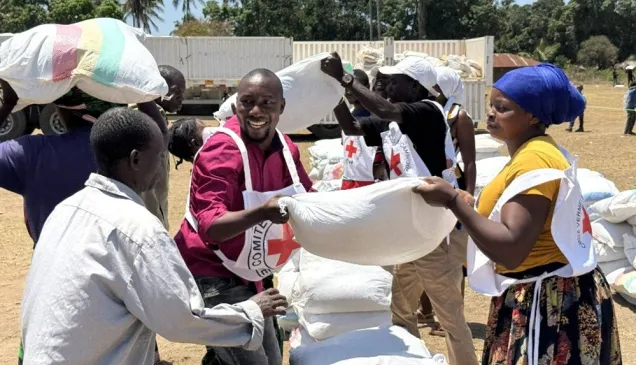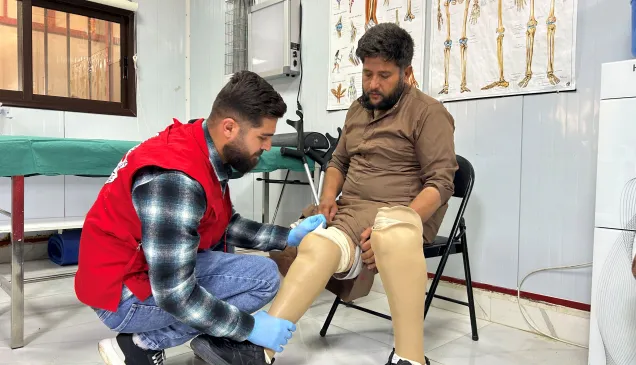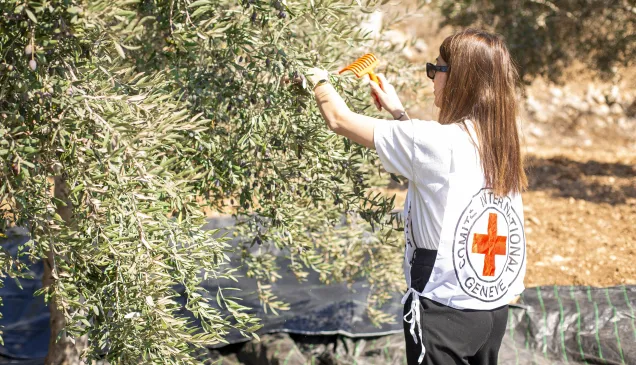ICRC healthcare activities for diabetes patients in Iran, Pakistan and Syria
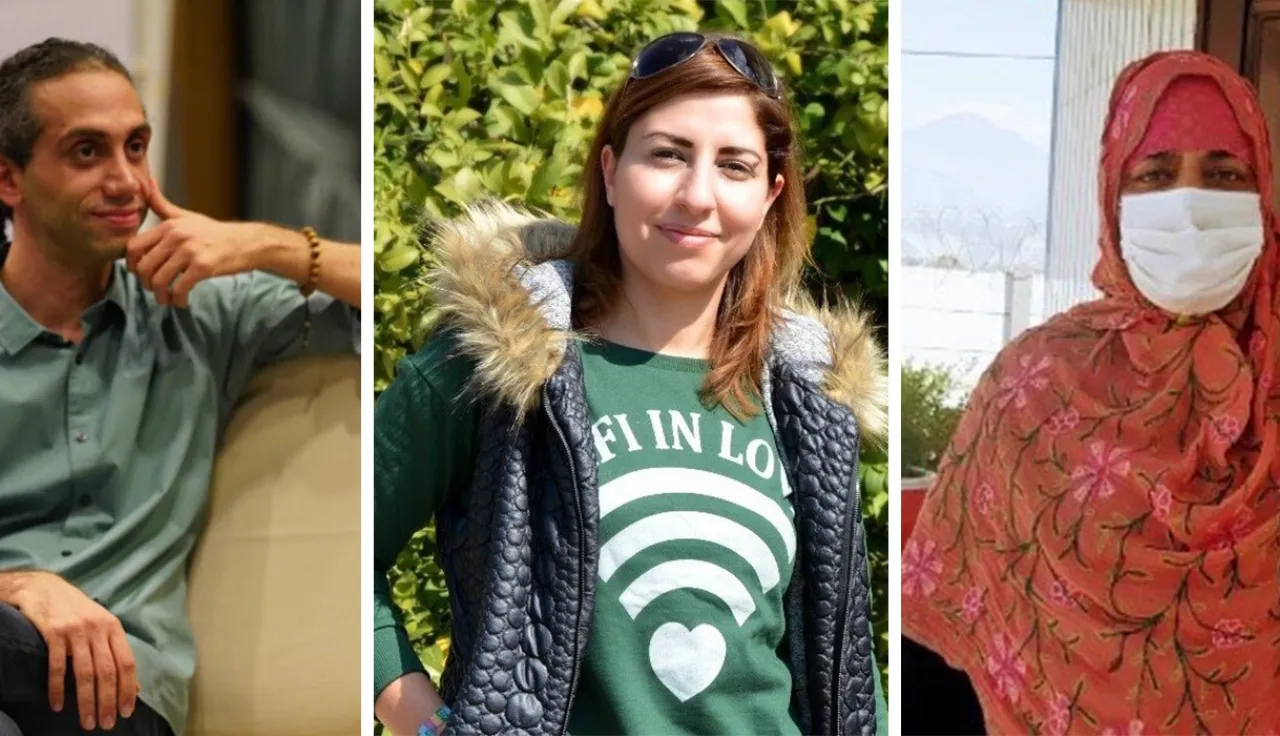
The theme of this year's World Diabetes Day on November 14th was "Nurses make the difference", with the aim to stress the crucial role that nurses play in supporting people living with diabetes, particularly in health education. For this occasion, we have illustrated ICRC diabetes-related projects in three different contexts - Iran, Pakistan and Syria.
Below you will find interviews with Mojtaba Kazemian, Health Field Officer in Iran, Zohra Mhamdi, Health Coordinator in Pakistan, and Kinda Khamasmie, Health Field Officer in Syria. We are also very grateful to have contributions from nurses and lady health workers working in partnering organizations from these three contexts.
As illustrated in some of the examples from the field shown below, in line with the ICRC integrated approach, the health teams are strengthening the links with EcoSec, particularly in terms of Nutrition. Consultation with a nutritionist is an indispensable part of the medical treatment, but the service provided goes even beyond that - with healthy lifestyle education, visits to local markets with beneficiaries and advice on the healthy food purchase, gardening projects, food vouchers.
For further reading, see the ICRC Operational guidelines - Managing projects addressing non-communicable diseases.
Finally, we also recommend to check out the ICRC recently published guideline, Management of Diabetic Foot.
Iran: Diabetic care programme for the vulnerable community of migrants in Mashhad
Interview with: Mojtaba Kazemian, Health Field Officer
Who are the beneficiaries of the health services that you deliver in Iran?
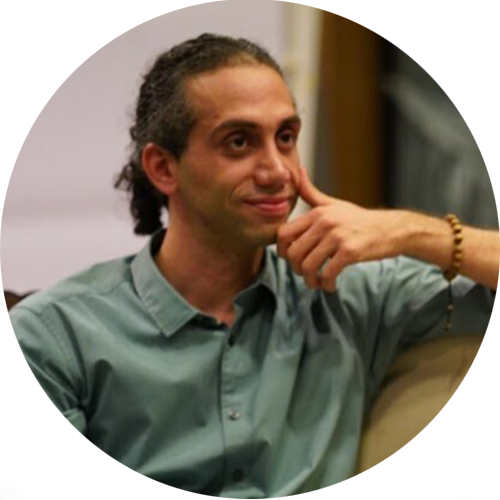 "We started our project in 2013 in Mashhad, a city with the highest number of undocumented refugees from Afghanistan, located in the North-East of the country. As you know, a lot of Afghans, have been forced to leave their country as a result of four decades of conflict, and have sought refuge in Iran which has become a sort of migratory route in the region.
"We started our project in 2013 in Mashhad, a city with the highest number of undocumented refugees from Afghanistan, located in the North-East of the country. As you know, a lot of Afghans, have been forced to leave their country as a result of four decades of conflict, and have sought refuge in Iran which has become a sort of migratory route in the region.
Together with the Iranian Red Crescent Society, we made an agreement with the Society for Recover Support (SRS), a well-known and authorized NGO with a history of supporting refugees and providing different types of services to vulnerable beneficiaries countrywide.
In Mashhad, as front-liners, they work directly with beneficiaries, and the ICRC team, based in Teheran, provides technical support in terms of capacity building, monitoring and evaluation, and finances. SRS has a building in Mashhad, with different departments including a health care clinic.
Our target group is mostly a particularly vulnerable undocumented Afghan community, with different problems such as high illiteracy rate, unemployment, mental health disorders, drug addiction. Given their undocumented status, they have many barriers to access health care services. SRS is offering a large portfolio of services, including primary health care, psychological and psychiatric therapies, physical rehabilitation, nutrition, social and community support, and harm reduction.
In the pilot phase of the project, to establish and introduce ourselves and the services we deliver, we were organizing home visits with a nurse, a psychologist, and a social worker. Now after seven years, the project is more and more recognised in the area and has become an essential social service for the community. Even though we still continue with the home visits, more and more people are now coming to the clinic in Mashhad on a daily basis. Our team also relies on volunteers who facilitate the relationship with the community.
In healthcare, we offer a range of services for non-communicable diseases, especially for diabetes and hypertension. Vulnerable civilians, elderly, women and children are the main beneficiaries who receive consultation related to diabetes."
What are the main services that you deliver to diabetic patients?
"We provide a package of services: consultations with a general physician, nursing support, a nutritionist, laboratory and radiology services, free medicine, awareness-raising, and health education on different topics. We also have a referral system to the secondary health services, in case our beneficiaries need to see a specialized doctor. We have an agreement with a secondary health care clinic in the same area as well as with a nearby pharmacy.
One of the services that our team provides is physical rehabilitation to those in need. For example, patients with diabetic foot are referred to the PRP team at the SRS who can provide consultation or training or refer the patient to a specialised doctor at the secondary level of care. Our beneficiaries can also have mental health and psychosocial support, with four psychologists that are working in the team.
Since our beneficiaries suffer from different types of mental problems and anxiety, this is a necessity. In this project, there is an emphasis on strengthening community protection by creating some self-help groups where women from the community share their problems and make bonds between themselves and other community members. We are planning to form the same type of groups for diabetic patients, with the aim to empower them, enable better access to them for sharing health messages, and support them psychologically.
Another component of this project is linked to nutrition. Our nutritionist provides consultation and education on a healthy diet, in particular to diabetic patients. Since many of our beneficiaries have low income, our nutritionist goes to the local market with them and educates them on how to ensure their dietary and nutrition needs are met, even with a limited budget. The SRS also organises the distribution of food parcels to beneficiaries, based on the advice of the health team.
In view of reassessing and improving the quality of care for diabetic patients, in 2020 we made a thorough assessment. Based on the results, we started working on three different layers: access to the beneficiaries to provide regular health care, improve the diagnosis, and the treatment. First, we have provided capacity building and training to SRS on data registration of patients, in which the ICRC has very good expertise.
Now they have a better overview of the real impact of their health services for diabetic patients, including who the patients are and what their needs are. For instance, they can see the percentage of people who are reacting well to the treatment, those who should receive more treatment, or be referred to.
Secondly, we asked registered patients to come more regularly to do the laboratory tests, which is very important for diabetic patients, especially to monitor the level of haemoglobin A1c, an important indicator for diabetes control. It is also recommended for every diabetic patient to come for a consultation at least once per quarter and many departments get involved to track those patients not showing up regularly, to call them, and to make home visits.
This is however not an easy task to achieve with our vulnerable target groups. During COVID-19 times, we also organized some online training and disseminated educational material on health issues and highlighted the importance of regular monitoring and consultation, as well as doing regular lab tests.
During this last year, we are focusing more on drug provision. Due to sanctions and economic situation, we had some concerns about the provision of drugs to diabetic patients, so we are monitoring the situation more closely and have been in contact with the pharmacy in case of eventual shortages. In order to improve the quality of the treatment, we also started working on strengthening the referral system. Also, we are reviewing national guidelines and the guidelines provided by the ICRC with the medical team of SRS. We have been lucky to recruit a data assistant and move to a new building where services can be provided in a more spacious place."
What impact had these activities on your beneficiaries?
"In general, we have over 2,000 active beneficiaries who receive some sort of service from SRS in Mashhad, around 650 of them are registered as health care beneficiaries. This is also the maximum number of patients that we can cover, due to the number of health staff available at the clinic. Out of this number, 250 are diabetic patients.
Although during COVID-19 peak the number of consultations temporarily dropped to 30-40%, intensive follow-ups of patients resulted in the highest access rate for the beneficiaries in the last years. The number of patients who come to the clinic on a quarterly basis has increased by 20% in the last quarter compared to the quarter before. Also, following the recent planning we had, the number of registered diabetic patients who had their laboratory test in the last quarter jumped to 97%, which is close to an ideal result."
What is the structure of the Health team in Iran?
"ICRC in Tehran has three health staff: Health Project Manager, Health Field Officer, and MHPSS Officer. In SRS, there are about 20 highly motivated people, some of them are health workers and some are working in other departments.
I would also like to thank ICRC colleagues who started this project and trained us – our former Health Delegate Sarah Wacheke Mburu, former MHPSS Delegate Sophia Gimenez, and the former Project Manager of this project Farhad Arabpour. Of course, we are also very well supported by the ICRC Delegation in Teheran and by the ICRC Health team in Geneva."
Nurse: Fahimeh Mohammad Zadeh, SRS
"I joined this team when the project with the ICRC started in 2013. My main responsibilities include the screening of beneficiaries and identifying the most vulnerable ones in need of our services, checking of vital signs and blood sugar of patients, keeping a record of the laboratory tests of patients, and providing them with relevant training on health issues and diabetes.
Since 2017, special attention has been devoted to patients with diabetes in the medical part of our project. Overall, different services are provided to this group of patients, including consultation by our general practitioner, referral to specialized doctors (internist, ophthalmologist, cardiologist, etc.), free medicine, referral to laboratory and radiology centres, delivery services for diabetic pregnant women and intensive cases for the newborn babies, regular check of blood sugar of diabetic patients, and awareness-raising to the society.
The education we provide is mainly on what diabetes is and its different types, symptoms, and potential short-term and long-term complications, preventive measures, how to control blood sugar for the patients regularly, and the correct way of insulin injection. Moreover, together with our nutritionist, we give consultation on the best diet for this group.
The ICRC health team monitors the quantity and quality of these services on a regular basis. During these years, our participation in workshops on diabetes control and treatment as well as the quality of training we provide to the target population resulted in higher efficiency of our health care services. Working in this project and assisting the vulnerable Afghan refugee community profoundly satisfies me. Their lovely smiles when getting any service from us are extremely appreciated by all of us. "
Pakistan: Lady health workers raise awareness about non-communicable diseases
Interview with: Zohra Mhamdi, Health Coordinator
What is the general situation in Pakistan regarding diabetes care? 
"One of the major particularities and complexities here in Pakistan is that, unlike many other countries, there is no a plan of action or a health policy delivered at the national level for the diseases with high prevalence in the country, such as non-communicable diseases (diabetes, high blood pressure, cancer etc.). The public health system here is decentralized at the province level, so each province is responsible to develop its own plan of action. On the other hand, according to different reports, the prevalence of diabetes in Pakistan is very high, it goes beyond ten per cent at the national level. Bearing in mind that Pakistan is a very big country and with important demographics, with over 212 million people, these numbers are high."
Could you tell us more about your project related to diabetes?
The activities related to diabetes care started at the ICRC supported Physical rehabilitation centre in Muzaffarabad. Our team realized that most of the amputations were linked to diabetes complications, rather than to the conflict situation. This was an alarm for our team who realized that there was an obvious need to strengthen the health services for patients with diabetes.
We are today supporting the basic health unit in Muzaffarabad, where we have established a sort of a diabetes centre. In this project, we are leaning on our partner, The Diabetic Centre in Islamabad, as they have specialized and skilled staff, and lady health workers who are going to the community and reaching out to the beneficiaries.
There are almost 10,000 of lady health workers in Pakistan. They are the pillar of all the community-based health services. They go to homes, they sensitize and educate the community about important health aspects, they assess the needs and provide support. For example, for the mother and child healthcare, epidemics – now we have an epidemic of dengue, for the vaccination, they assess who is vaccinated and who is not and then share the data with the district health office.
Our approach is not only curative, we are doing a lot in terms of prevention and reaching out to the patient, especially to vulnerable ones. As shown by different international studies, the more you reach out to patients, the better the outcomes of their health condition will be. So, we don't wait for patients to come for a consultation.
We rely on the lady health workers to visit local inhabitants at their home, to provide educational sessions and raise awareness not only about diabetes, but about other non-communicable diseases also. They are offering educational sessions on a healthy lifestyle and a healthy diet and are sensitizing the community on how to prevent diseases and seek healthcare.
The ICRC has also equipped the basic health unit in Muzaffarabad with needed items and equipment for the treatment of diabetes. Apart from some support for the laboratory, we also cover the costs of purchase of medicine for diabetes, approved and recommended by the WHO. It is the district health office who buys the medicine.
We are also providing outpatient registers, where the health staff can collect all the data related to the patients during consultation. With the help of The Diabetes Centre in Islamabad, we provide training to the health staff in Muzaffarabad about the diabetes patients' needs, how and what should be monitored and how to manage the treatment according to the results.
For complicated cases and patients who need specialized services, we have started to develop and strengthen the referral system to the two main secondary level hospitals in Muzaffarabad or to the PRP centre.
How did the COVID-19 pandemic affect these activities?
"When COVID-19 started, a decision was made to close all outpatient departments. At first, the triage was handled via the emergency departments of the public health facilities only. This had a huge impact on the access to the health care services, especially for the vulnerable ones and those highly affected by the COVID-19 crisis in terms of economy and their daily business shut down.
Without money, they couldn't look after their diet or keep a healthy lifestyle and there was a high probability they might run out of medicine. So, we decided to reach out to them.
First, together with The Islamabad Diabetic centre, we have established a system of online medical consultations for people who may need it and publicized it via the centre's web site. We went to the community to deliver medicine. Since the needs were huge and we alone with the centre couldn't cover everything, the local health authorities at district and provincial levels were contacted to organize some awareness-raising events and provide support to diabetes patients.
This was done across Islamabad, Rawalpindi, Khyber Pakhtum and Pakistan-administered Kashmir. The ICRC has provided medicine to the authorities to deliver them to registered patients of primary health centres.
During Ramadan, we were communicating a lot via our Facebook page and The Diabetes Centre web page by providing guidance and advice related to COVID-19, Ramadan and diabetes. A helpline was also enabled, with health staff from the Diabetes Centre giving online consultation to people who couldn't go and visit their doctor.
Additionally, as we didn't know how much time the lockdown with COVID would last, and since we needed to make sure that the patients were monitored on a quarterly basis, we have put in place and covered the costs of a recall system, where the staff of the basic health unit in Muzaffarabad contacted diabetes patients registered at their centre.
For this purpose, we have developed a questionnaire in English and in Urdu and then trained the staff in order to make sure that we have the same understanding of the questions and instructed them on how to carry out the calls with the patients.
We are now considering to empower the lady health workers with this questionnaire via their smartphones, so that they can ask the same questions to the patients when they visit them at their homes and have a what's up call with a medical officer at the basic health unit, in case they see the patient needs to have a consultation with a doctor.
In total, during the COVID-19 campaign, over 1,800 patients benefited from our services, including consultations and delivered medicines."
Salma Gillani, Supervisor of Lady Health Workers, City BHU Muzaffarabad
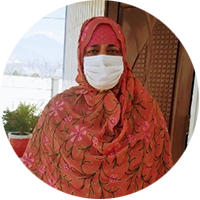 "In our health facility, there are 32 lady health workers who give health education sessions on different diseases like diabetes in their respective local community. We arrange health sessions and provide awareness on the prevention of diabetes. We refer diabetes patients to the health centres where medical doctors do their treatment. The follow up of these patients is also our responsibility. If a patient is having uncontrolled diabetes or having complication like diabetic foot, then we refer him to The Diabetes Centre in Islamabad.
"In our health facility, there are 32 lady health workers who give health education sessions on different diseases like diabetes in their respective local community. We arrange health sessions and provide awareness on the prevention of diabetes. We refer diabetes patients to the health centres where medical doctors do their treatment. The follow up of these patients is also our responsibility. If a patient is having uncontrolled diabetes or having complication like diabetic foot, then we refer him to The Diabetes Centre in Islamabad.
We provide diabetes patients with information about healthy diet, exercise, preventive measures for diabetes and we monitor their weight. We are thankful to the ICRC for their support."
Syria: Support for 53,000 diabetic patients
Interview with: Kinda Khamasmie, Health Field Officer, Syria
What does the ICRC diabetic care programme in Syria consist of? 
"When we started back in 2018, we started on an ad hoc emergency basis with the supply of medicines, in particular of insulin because of the lack of insulin in the country. We then pursued a Memorandum of cooperation with the Ministry of Health to provide regular programme support.
We agreed to support the MoH facilities in four pillars: medical medicine supplies, furnishing and equipment of centres with needed materials to provide better care of diabetic patients, decrease negative health outcomes and to enhance information, education and communication packages; printing of publications or enhancing educational health sessions for the patients. The fourth pillar is to support capacity building program for health care professionals working in diabetes supported facilities.
Now, we are supporting 16 health centres of the MoH, in four different governorates of the country: Damascus, Rural Damascus, Aleppo, and Rural Tartus, plus one mobile team that provides care in hard-to-reach areas where the health care is not available. 14 of these facilities are primary health care centres.
Two of them, one in Damascus and another one in Aleppo, are specialised diabetic centres, dedicated only to the care and follow up of diabetic patients, with a possibility to follow up for cardiovascular and renal complications, or diabetic foot for example. In general, we support up to 53,000 diabetes patients registered in these supported health facilities and with the mobile unit."
Can you describe particular activities for each of these four pillars?
"In terms of supply of medications, we are focusing on insulin, because the main pharmaceutical companies in the country were caught in the fire lines and they stopped producing for quite a long time. Today, the ICRC is providing insuline for up to 40% of insuline-dependent patients registered at the Ministry of Health, or 300,000 vials out of the 900,000 vials which is a total need for Syria registered in the Ministry of Health's system.
We are supporting 15,000 insulin-dependent diabetic patients every month. In places where they do not have access even to oral medication, we are supporting on an ad hoc basis with oral medication for diabetic patients. All the medicine is supplied from Geneva on a regular basis.
In terms of furniture and equipment, it depends on the status per clinic as we are filling in the gaps of an already functional facility. In places like Aleppo or in rural Damascus, where the health care centres were damaged, we are supporting with minor reparations, by replacing windows, repairing the ceilings or providing generators, furniture for doctors to be able to work in the examination rooms, chairs, desks etc. We supported the centres with basic medical equipment, for example, sphygmomanometers, stethoscopes, examination beds and laboratory equipment like HbA1c and chemistry analysers.
We supported the MoH in production and printing of brochures or flyers for distribution during educational sessions, or on particular occasions, such as Ramadan, when the patients need to adapt their lifestyle and medication, we produced booklets dedicated to both the health educator and the patient, to help them control their disease during the fasting period.
We organise regular gatherings or workshops with health staff coming from different parts of the country, where they share experiences, try to find solutions and adapt to challenges. We have 120 participants on a yearly basis or around 40 participants for each gathering.
The topic is different every year, and this year it was about COVID-19. Up to now, we were able to provide the training for 85 staff on infection prevention control and the use of personal protective equipment in the supported facilities. We also provided workshops and training for 60 health educators across the country regarding the key messages and instructions that they need to deliver to patients with chronic diseases during COVID-19 pandemic."
How is the mobile team organised?
"It is the first time in Syria that chronic diseases are diagnosed and treated up by a mobile unit by MoH. It came out of need because the infrastructure is damaged, health care professionals are not available in rural areas. There are security and economic barriers for the community (mostly IDPs and returnees) to come to the city health centre, so this is the only way to support these patients. With this mobile unit, we can provide the follow-up for stable patients and those with complications need to be referred.
The mobile team is attached to a diabetes centre in Aleppo, which we are supporting. The team is composed of a doctor, a health educator, a nurse and a driver. They use a vehicle rented by the ICRC. They have a rotation plan of nearly 22 villages which they visit each month. We have areas within 50 km from this fixed centre, but also the areas that are 85 km far from it, so the mobile team has to travel up to two hours each day to reach the patients.
Through the community, we announce the visits of the mobile team according to the rotation plan and these consultations are usually held either in a MoH's vaccination post, in a mosque or every other possible venue we can use for this purpose."
How do you manage the referrals?
"In terms of referrals, in Syria, there is no formal referral pathway. When we want to refer the patient, we are doing it usually with an informal prescription, meaning that it is not mandatory, and it is up to the patient to pursue and see a specialized doctor. In the city, it is easier, because services are available to some extent. In rural areas, there are many challenges for the Continuum of care like access, security and economic challenges.
ICRC also has the physical programme rehabilitation in Syria, with one ICRC PRP centre in Aleppo, with ICRC staff, and another PRP centre in Damascus, managed by the Syrian Arab Red Crescent (SARC), that we are supporting. If their patient's condition is related to diabetes, they have the list of ICRC supported health facilities and advise the patient where to go but still it is all informal and far away from ideal.
Providing a continuum of care and suitable referral pathways for patients is becoming a daily challenge for health care providers, in a very volatile setting, where problems like security barriers and availability of services and human resources are complicated by the economic crisis and Covid-19 pandemic."
Nurse: Mounera Othman
"My name is Mounera Othman and I am a nurse in the Diabetes program in Aleppo and health educator for more than 20 years. I work as a nurse in the Pediatric Diabetes clinic in Ashrafieh Specialized Diabetes Centre since the reactivation of the centre at the beginning of 2018 and I support the Diabetes mobile team once per week with visits to rural areas of Aleppo.
Since June 2019 the Directorate of Health in Aleppo with the support of the ICRC activated the Paediatrics Diabetes clinic in Aleppo Ashrafieh specialized Diabetes centre. This is, in my opinion, a very important step where 600 registered children could receive quality care services, like proper diagnosis and insulin treatment.
We were able with the ICRC support to provide these children with glucometers and strips that they cannot provide on their own because of the pressing economic situation. Most importantly, this clinic created a venue for the children and their parents to discuss challenges, and have health education related to lifestyle modification, proper diet, and follow up for the complications.
We activated health education sessions and activities for the children and their parents before the COVID-19 pandemic. You could clearly see that the children after these sessions felt supported and not facing this disease alone.
A very beautiful eleven years old girl recently diagnosed with diabetes reached out to me after one of the sessions and said: "I am not afraid any more, I know how to administer insulin and I know what to eat and I will still go to school and become an engineer." This made me very keen to work in this clinic for twenty more years. I really hope that the Covid-19 pandemic resolves soon so we can get back to our regular activities.
I am also very proud that I am a part of the diabetes mobile team and I accompany them once per week, where we visit rural areas 100 km away from the city centre. It is never an easy journey or destination through unpaved roads, and multiple checkpoints and crosslines to reach the final beneficiaries, but once finally arrived you feel very thrilled actually to deliver services to patients, IDPs and returnees who, for economic, security and other reasons, cannot reach the centre to have health care.
Each visit we carry with us insulin, oral anti-diabetes medication, so we can examine the patients, provide treatment and basic follow up like rapid glucose check and blood pressure monitoring.
After one year of these services, we have a very good relationship with the patients and community; the patients actually wait for us per the announced dates of visits each month, they are now very open and accepting our advice and health education services as well, they share with us their lifestyle modification like diet and sport. We hope to continue with that support until the fixed clinics that were destroyed are re-established and the patients have regular access to health services."
Other resources:
Voices from Yemen is a brief video testimonial of two beneficiaries from Yemen who were treated for diabetic foot complications.

